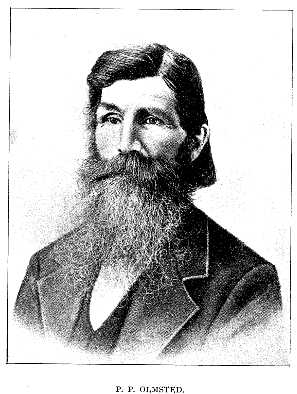Hon.
Phineas P. Olmsted is one of the prominent old
settlers of Clayton County, his home having been for more
than forty years at the place where he still resides. His
valuable farm, which comprises three hundred and
thirty-eight acres, is situated on sections 1,2,11 and 12
and has been brought under cultivation from an
uncultivated state by the present owner.
A native of Franklin County, Vt., our subject was born
near St. Albans and Burlinton, March 27, 1819. The family
is of English descent, and the great-grandfather of
Phineas P., Daniel Olmsted, was born in Connecticut, to
which state his ancestors emigrated in 1640 from England.
The next in line of descent, Nathan, whose birth also
occurred in the Nutmeg State, took part in the War for
Independence, along with several of his brothers.
Timothy Olmsted, the father of our subject, was born in
1767 in Connecticut and grew to manhood on the same farm
which had been occupied for years by his forefathers.
About 1800 he removed to Franklin County, Vt., where for
the remainder of his life he engaged in cultivating a
farm. In politics he was a Whig, and he was an Anti-Mason
at the time of the killing of Morgan. Religiously he was
connected with the Congregational Church, and was a man
of sterling uprightness and integrity. His wife, Eunice,
was born in New Hampshire in 1780 and was a daughter of
Phineas Page, who was born in Massachusetts; he was of
English origin, while his wife was of French descent.
Mrs. Olmsted died in her eighty-sixth year. The father
had been previously married, by his first union having
nine sons and two daughters who grew to maturity, and by
his second having two sons, Phineas P. and David.
Until twenty years of age Phineas P. Olmsted continued to
make his home with his parents, attending the common
schools, and received practical instruction on his
father's farm in the duties pertaining to agriculture.
Starting for the west he worked at different points in
order to obtain money to continue his journey, and for a
time was employed at Madison, Wis. From there he
proceeded to Grant County, thence to Prairie du Chien, in
which place he resided until April 1, 1840. Near Patch
Grove, Wis., he taught school for three months, when he
learned that the Government had commenced building Ft.
Atkinson on the Turkey River, and in company with his
brother he went there to look the country over. This
brother and he soon selected a claim in what is now
Monona Township, and the two were the first to settle
within its limits. They built a cabin in July, 1840, and
kept house in primitive fashion, often entertaining
travelers, and also Indians. At that time there were
about two hundred redmen in the township, who were known
as the Whirling Thunder Band. At one time when the cabin
was only partially constructed, the brother of our
subject was obliged to go on business to Wisconsin, and
during his absence about eight Indians came to beg for
food; young Phineas gave them what he could, for his
supplies were at a low ebb, but it was evident the redmen
were not satisfied, as they kept looking around in all
corners for more. Seeing a knife in the hand of a
murderous looking brave concealed under his blanket, he
knew at once that trouble was brewing; as he had no other
weapon handy, he picked up an axe and spoke in a loud
voice commanding the Indians to begone. After looking at
hiim for a moment rather to his surprise they departed,
and this was th eonly time in his eight years' of
experience with the Indians that he believed they meant
him personal harm.
In the spring of 1841 the brothers sold their claim and
removed to the present site of Monona, where they each
took up land. Phineas P. Olmsted built a log house, the
first one in Monona, and in 1849 with a nephew started
the first general store in the town. The same year a
postoffice was established here, our subject becoming the
first Postmaster, being appointed under Taylor's
administration. At the end of three years he resigned,
locating on the place where he now resides and erected
the frame house where he has resided ever since. At
various times he has owned several farms and has given to
his children about three hundred and thirty acres, still
retaining a property of about the same area.
December 26, 1843, Mr. Olmsted married Hannah Rowe, who
was born near Albany, N.Y., and they have had six
daughters and two sons to bless their union. Eunice is
deceased, and the others in order of birth are as
follows: Irving D.; Clara, the wife of Harvey S. Curtis;
Hannah, deceased; Esther, wife of Melvin Davis; Parma,
Mrs. Henry Wilson; Phineas P.; and Sarah, wife of Frank
Gilbert.
Mr. Olmsted has served in various official capacities. In
1841 he was first elected Justice of the Peace, sserving
as such for twelve years, and in 1842 he built the first
frame house in Monona village, and in 1860 was made
County Supervisor, holding that place for sixteen years.
In 1865 he was elected on the Republican ticket as County
Representative in the Legislature and he has filled
various minor positions. As an Odd Fellow he belongs to
Monona Lodge. He is very proud of the fact that he has
twenty grandchildren and two great-grandchildren, and is
a man whose chief joy in life has been in his domestic
relations.
~source: Portrait
and Biographical Record of Dubuque, Jones and Clayton
Counties; Chicago: Chapman Pub. Co., 1894; pg 401-402
-transcribed by Sharyl Ferrall
|
![]()
